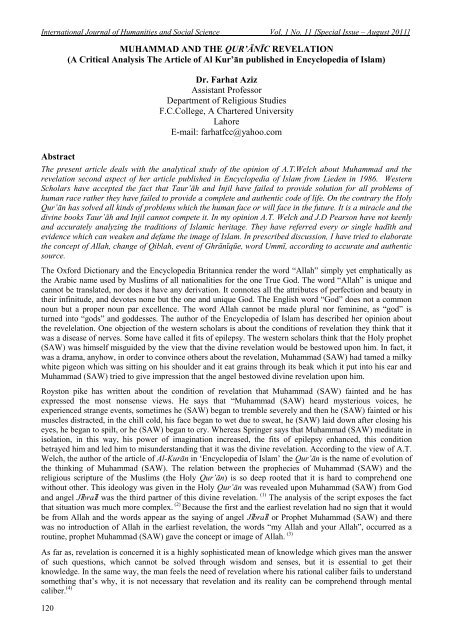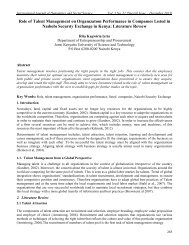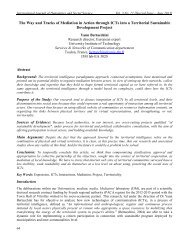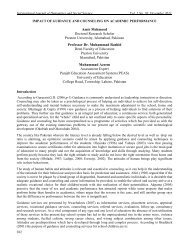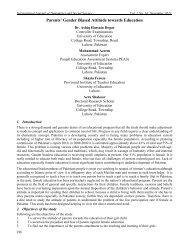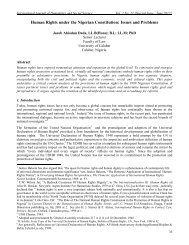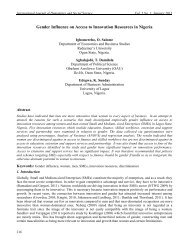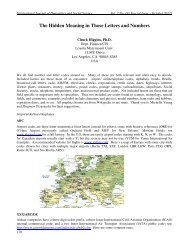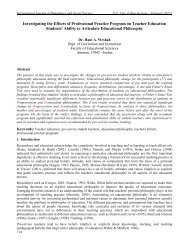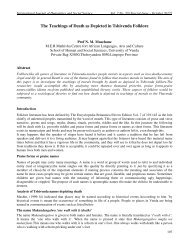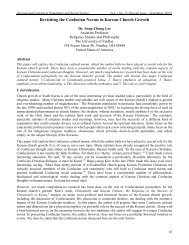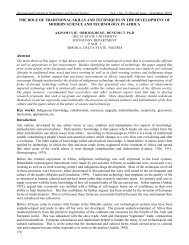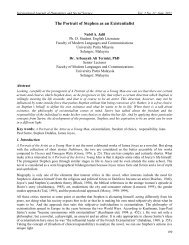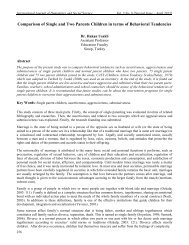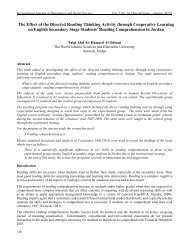muhammad - International Journal of Humanities and Social Science
muhammad - International Journal of Humanities and Social Science
muhammad - International Journal of Humanities and Social Science
You also want an ePaper? Increase the reach of your titles
YUMPU automatically turns print PDFs into web optimized ePapers that Google loves.
<strong>International</strong> <strong>Journal</strong> <strong>of</strong> <strong>Humanities</strong> <strong>and</strong> <strong>Social</strong> <strong>Science</strong> Vol. 1 No. 11 [Special Issue – August 2011]<br />
Abstract<br />
120<br />
MUHAMMAD AND THE QUR’ĀNĪC REVELATION<br />
(A Critical Analysis The Article <strong>of</strong> Al Kur’ān published in Encyclopedia <strong>of</strong> Islam)<br />
Dr. Farhat Aziz<br />
Assistant Pr<strong>of</strong>essor<br />
Department <strong>of</strong> Religious Studies<br />
F.C.College, A Chartered University<br />
Lahore<br />
E-mail: farhatfcc@yahoo.com<br />
The present article deals with the analytical study <strong>of</strong> the opinion <strong>of</strong> A.T.Welch about Muhammad <strong>and</strong> the<br />
revelation second aspect <strong>of</strong> her article published in Encyclopedia <strong>of</strong> Islam from Lieden in 1986. Western<br />
Scholars have accepted the fact that Taur’āh <strong>and</strong> Injil have failed to provide solution for all problems <strong>of</strong><br />
human race rather they have failed to provide a complete <strong>and</strong> authentic code <strong>of</strong> life. On the contrary the Holy<br />
Qur’ān has solved all kinds <strong>of</strong> problems which the human face or will face in the future. It is a miracle <strong>and</strong> the<br />
divine books Taur’āh <strong>and</strong> Injil cannot compete it. In my opinion A.T. Welch <strong>and</strong> J.D Pearson have not keenly<br />
<strong>and</strong> accurately analyzing the traditions <strong>of</strong> Islamic heritage. They have referred every or single hadīth <strong>and</strong><br />
evidence which can weaken <strong>and</strong> defame the image <strong>of</strong> Islam. In prescribed discussion, I have tried to elaborate<br />
the concept <strong>of</strong> Allah, change <strong>of</strong> Qiblah, event <strong>of</strong> Ghrānīqūe, word Ummī, according to accurate <strong>and</strong> authentic<br />
source.<br />
The Oxford Dictionary <strong>and</strong> the Encyclopedia Britannica render the word “Allah” simply yet emphatically as<br />
the Arabic name used by Muslims <strong>of</strong> all nationalities for the one True God. The word “Allah” is unique <strong>and</strong><br />
cannot be translated, nor does it have any derivation. It connotes all the attributes <strong>of</strong> perfection <strong>and</strong> beauty in<br />
their infinitude, <strong>and</strong> devotes none but the one <strong>and</strong> unique God. The English word “God” does not a common<br />
noun but a proper noun par excellence. The word Allah cannot be made plural nor feminine, as “god” is<br />
turned into “gods” <strong>and</strong> goddesses. The author <strong>of</strong> the Encyclopedia <strong>of</strong> Islam has described her opinion about<br />
the revelelation. One objection <strong>of</strong> the western scholars is about the conditions <strong>of</strong> revelation they think that it<br />
was a disease <strong>of</strong> nerves. Some have called it fits <strong>of</strong> epilepsy. The western scholars think that the Holy prophet<br />
(SAW) was himself misguided by the view that the divine revelation would be bestowed upon him. In fact, it<br />
was a drama, anyhow, in order to convince others about the revelation, Muhammad (SAW) had tamed a milky<br />
white pigeon which was sitting on his shoulder <strong>and</strong> it eat grains through its beak which it put into his ear <strong>and</strong><br />
Muhammad (SAW) tried to give impression that the angel bestowed divine revelation upon him.<br />
Royston pike has written about the condition <strong>of</strong> revelation that Muhammad (SAW) fainted <strong>and</strong> he has<br />
expressed the most nonsense views. He says that “Muhammad (SAW) heard mysterious voices, he<br />
experienced strange events, sometimes he (SAW) began to tremble severely <strong>and</strong> then he (SAW) fainted or his<br />
muscles distracted, in the chill cold, his face began to wet due to sweat, he (SAW) laid down after closing his<br />
eyes, he began to spilt, or he (SAW) began to cry. Whereas Springer says that Muhammad (SAW) meditate in<br />
isolation, in this way, his power <strong>of</strong> imagination increased, the fits <strong>of</strong> epilepsy enhanced, this condition<br />
betrayed him <strong>and</strong> led him to misunderst<strong>and</strong>ing that it was the divine revelation. According to the view <strong>of</strong> A.T.<br />
Welch, the author <strong>of</strong> the article <strong>of</strong> Al-Kurān in „Encyclopedia <strong>of</strong> Islam‟ the Qur’ān is the name <strong>of</strong> evolution <strong>of</strong><br />
the thinking <strong>of</strong> Muhammad (SAW). The relation between the prophecies <strong>of</strong> Muhammad (SAW) <strong>and</strong> the<br />
religious scripture <strong>of</strong> the Muslims (the Holy Qur’ān) is so deep rooted that it is hard to comprehend one<br />
without other. This ideology was given in the Holy Qur’ān was revealed upon Muhammad (SAW) from God<br />
<strong>and</strong> angel Jῑbraῑl was the third partner <strong>of</strong> this divine revelation. (1) The analysis <strong>of</strong> the script exposes the fact<br />
that situation was much more complex. (2) Because the first <strong>and</strong> the earliest revelation had no sign that it would<br />
be from Allah <strong>and</strong> the words appear as the saying <strong>of</strong> angel Jῑbraῑl or Prophet Muhammad (SAW) <strong>and</strong> there<br />
was no introduction <strong>of</strong> Allah in the earliest revelation, the words “my Allah <strong>and</strong> your Allah”, occurred as a<br />
routine, prophet Muhammad (SAW) gave the concept or image <strong>of</strong> Allah. (3)<br />
As far as, revelation is concerned it is a highly sophisticated mean <strong>of</strong> knowledge which gives man the answer<br />
<strong>of</strong> such questions, which cannot be solved through wisdom <strong>and</strong> senses, but it is essential to get their<br />
knowledge. In the same way, the man feels the need <strong>of</strong> revelation where his rational caliber fails to underst<strong>and</strong><br />
something that‟s why, it is not necessary that revelation <strong>and</strong> its reality can be comprehend through mental<br />
caliber. (4)
The Special Issue on Arts <strong>and</strong> <strong>Social</strong> <strong>Science</strong> www.ijhssnet.com © Centre for Promoting Ideas, USA<br />
According to this view, relation‟s explanation is that the word “Whahῑ” (revelation) <strong>and</strong> “Ehya‟” are the<br />
Arabic word can according to grammar, they mean to point out something abruptly whether it is symbolically<br />
or the utter some voice meaninglessly, or to move some limb or through writing or images, in this way, these<br />
words can be used appropriately for every situation. (5)<br />
According to Shriyā, “Whahῑ” (revelation) means:<br />
“The message <strong>of</strong> Allah which was (directly) brought down upon Prophets”. (6)<br />
It is necessary to remember that the word Wahῑ revelation has become so popular according to its literally<br />
meaning that now it cannot be used for any other thing except the prophet. Where as, according to Anwar<br />
Shah Kashmirῑ, (ﻮﺣﻰ) revelation <strong>and</strong> Ehyau (ﺍﯾﺣﺎﺀ) are two different words <strong>and</strong> there is a little difference<br />
between them. Ehyau (ﺍﯾﺣﺎﺀ) is a common word according to meaning <strong>and</strong> it means to point out something <strong>and</strong><br />
to give concept to someone except prophets, therefore, this word is used for h<strong>and</strong>, “Whahῑ” (revelation) is<br />
called such feeling which only occurs to the prophets. That‟ why, the Holy Qur’ān has used the word Ehyau<br />
(ﺍﯾﺣﺎﺀ) for both prophets <strong>and</strong> non-prophets but has used the word Wahῑ only for the prophets. (7)<br />
Some misled people in the west may imagine Allah Marcel as a deity adopted by Muhammad <strong>and</strong> his<br />
followers, in Islam he is proclaimed as no other than the one true God who created <strong>and</strong> maintains the universe.<br />
Who through his extreme kindness <strong>and</strong> love <strong>of</strong> man sent down his messages <strong>of</strong> guidance <strong>and</strong> comfort. Who<br />
with his super-relative justice <strong>and</strong> mercy will in the Hereafter judge man for his work. As far as, the advent <strong>of</strong><br />
revelation upon Muhammad (SAW) is concerned, his preaching is different from the other Prophets (A.S.) (8)<br />
because from Hazrat Adam to every respected Prophets <strong>and</strong> pious person preached the message <strong>of</strong> Allah.<br />
They did not obey their own desires <strong>and</strong> wishes. They were bestowed the revelation in which Allah gave them<br />
his benevolence <strong>and</strong> favour that revelation was not different from the revelation which was bestowed upon<br />
Hazrat Muhammad (SAW). The revelation upon all the prophets has completely co-ordination <strong>and</strong> the same<br />
atmosphere because the origin <strong>and</strong> infinite <strong>of</strong> Wahῑ is the same <strong>and</strong> its aim <strong>and</strong> motives are also the same (9)<br />
(therefore, it is impossible that there would be any difference in the revelation).<br />
The Āyāt <strong>of</strong> Sūrah Al-Nῑsā is the evidence <strong>of</strong> this views that:<br />
“Verily, we have sent the revelation to you (O Muhammad (SAW) as we sent the revelation to Nūh <strong>and</strong> the<br />
prophets after him; we (also) sent the revelation to Ibraham, Isma’ῑl , Ishāq , Ya‟qub (Jacob) <strong>and</strong> the <strong>of</strong>fspring<br />
<strong>of</strong> the twelve sons <strong>of</strong> Ya‟qub, „Isa , Ayyub , Yunus , Hurrun <strong>and</strong> Sulῑmān (Solomon) <strong>and</strong> to Dawūd we gave<br />
the Zabūr <strong>and</strong> messengers we have mentioned to you before, <strong>and</strong> messengers we have not mentioned to you,<br />
<strong>and</strong> to Mūsā Allah spoke directly”.<br />
The name <strong>of</strong> those prophets which have been mentioned in this āyā, they were the famous prophets <strong>of</strong> Banῑ<br />
Īsraῑl <strong>and</strong> those Ihl-e-Kitāb inhabited near Hijāz, were aware <strong>of</strong> the where about <strong>of</strong> these prophets. (11) The<br />
message <strong>of</strong> script which was bestowed upon Hazrat Muhammad (SAW) is called revelation. The revelation is<br />
the something which was bestowed upon other previous prophets. In this, the meaning <strong>of</strong> revelation is the<br />
same among all the prophets <strong>and</strong> it has no difference. Allah says in the Holy Qur’ān,<br />
Nor does he speaks <strong>of</strong> (his own) desire. It is only a revelation revealed.<br />
The natural feeling <strong>of</strong> vision among animal is also called revelation. (12)<br />
It is Holy Qur’ān Allah says:<br />
And your Lord inspired the bee, saying: “take you habitations in the mountains <strong>and</strong> in the trees <strong>and</strong> in what<br />
they erect”. (13)<br />
The revelation is also a sign or a symbol, which would be made for meaning or motive. The Holy Qur’ān<br />
says:<br />
“Then he came out to his people from Al-Mihrab a praying place or a private room) <strong>and</strong> he told them by signs<br />
to glorify Allah‟s praises in the morning <strong>and</strong> in the afternoon”. (14)<br />
The tafsῑr <strong>of</strong> this ayā is that Hazrat Zikriā had abruptly pointed out with his finger <strong>and</strong> had not uttered<br />
anything. To point out with limbs is also called revelation. As a poet says:<br />
The devil that whispers evil in the minds <strong>of</strong> human beings <strong>and</strong> the evil views which the devil presents with<br />
very decorative way. The Holy Qur’ān also calls it revelation. The Holy Qur’ān says:<br />
And so we have appointed for every prophet enemies --- devils among mankind <strong>and</strong> jinn, inspiring one<br />
another with adorned speech as a delusion (or by way <strong>of</strong> deception). (16)<br />
Allah has given angels the orders, are also called revelation. Allah says:<br />
“(Remember) when your Lord revealed to angels, verily, I am with you”. (17)<br />
It is the duty <strong>of</strong> angel which the angel has been given, must convey to the prophet with utmost care. After this,<br />
it is the duty <strong>of</strong> the prophet to learn this message by heart <strong>and</strong> preach people about it Allah says:<br />
“So (Allah) revealed to his slave (Muhammad (SAW) through Jῑbraῑl whatever he revealed”. (18)<br />
121
<strong>International</strong> <strong>Journal</strong> <strong>of</strong> <strong>Humanities</strong> <strong>and</strong> <strong>Social</strong> <strong>Science</strong> Vol. 1 No. 11 [Special Issue – August 2011]<br />
This āyā means that Allah had given message to angel Jῑbraῑl <strong>and</strong> he conveyed this message to Muhammad<br />
(SAW) as it is. In this ayā, the advent revelation has used as Allah says:<br />
“And truly, this (the Qur’ān) is a revelation from the Lord <strong>of</strong> the worlds (mankind, jinn <strong>and</strong> all that exists),<br />
which the trustworthy Ruh (Jῑbraῑl) has brought down upon your heart (O Muhammad) that you may be (one)<br />
<strong>of</strong> the Warners” (19)<br />
In another place, Allah says,<br />
“Say I but fallow what is revealed to me from my lord”. (20)<br />
Allah addresses the non believers <strong>of</strong> revelation <strong>and</strong> says:<br />
“Did people w<strong>and</strong>er that we revealed a person among them that to warn people <strong>and</strong> congratulate those who<br />
believe that they shall have a fair reward. The pagan declared that (Muhammad) is a charmer.” (21)<br />
What is the reality <strong>of</strong> revelation <strong>and</strong> how much revelation upon Muhammad (SAW) resembles with the<br />
revelation upon other prophets. When Islam calls the mysterious <strong>and</strong> abrupt information revelation, it never<br />
ignores the literal meaning <strong>and</strong> explanation <strong>of</strong> revelation rather it enhances the literal meaning <strong>and</strong><br />
terminology <strong>of</strong> Wahῑ (revelation) <strong>and</strong> Ehya‟. Therefore the natural intuition <strong>of</strong> human beings has also been<br />
called revelation. Allah says:<br />
“And we inspired the mother <strong>of</strong> Musa (Mases) (telling): suckle him”. (22)<br />
And in another place, Allah says:<br />
“And when I (Allah) inspired Al-Hawārῑyūn the disciples) [<strong>of</strong> Isa (Jesus)] to believe in me <strong>and</strong> my messenger,<br />
they said: “We believe <strong>and</strong> bear witness that we are Muslims”. (23) Otherwise, when the Holy Qur’ān explains<br />
the literal meaning <strong>of</strong> revelation it does not weaken the mysterious <strong>and</strong> unknown relation between Allah <strong>and</strong><br />
his messengers through the revelation <strong>of</strong> divine books with the help <strong>of</strong> angels.<br />
Anwar Shah Kāshmῑrῑ has defined the three preliminary kinds <strong>of</strong> revelation. (24)<br />
1: The messenger or prophet is inspired with meaning <strong>and</strong> explanation as Hazrat Muhammad said:<br />
2: Allah addresses prophet without any hesitation or directly. (25) Allah says:<br />
“And to Musa Allah spoke directly”. (26) The third explanation <strong>of</strong> revelation is popular. According to the third<br />
kind. Allah sent is message to prophet through angel <strong>and</strong> angel conveys this message, sometimes it appears<br />
<strong>and</strong> sometimes, he does not seem rather only his voice can be heard, sometimes, he comes in disguise <strong>of</strong><br />
human being to convey message <strong>and</strong> sometimes, he appears in his own real form that prophet can see him but<br />
it happens <strong>of</strong>f <strong>and</strong> on. (27)<br />
The Holy Qur’ān has also pointed out these three kinds <strong>of</strong> revelation in the following āyā:<br />
“It is not given to any human being that Allah should speak to him unless (it be) by revelation, or from behind<br />
a veil, or (that) he sends a messenger to reveal what he wills by his leave”. (28)<br />
In this way, the first <strong>and</strong> foremost infinitive <strong>of</strong> Qur’ān is revelation Wahῑ. (29) Sometimes intuition is called<br />
revelation (30) which is not correct because when a man appears to have intuition <strong>and</strong> knowledge beyond<br />
surface , it does not mean that the specific person would be prophet <strong>and</strong> revelation would be brought down<br />
upon him. There, Wahi <strong>and</strong> prophethood consist <strong>of</strong> consciousness <strong>and</strong> feelings. (31)<br />
Hazrat Muhammad (SAW) was revealed through different ways. According to Hazrat Ayesha, Hazrat<br />
Muhammad (SAW) how revelation would be brought down upon him, Prophet Muhammad (SAW) said:<br />
“Sometimes I hear the sound <strong>of</strong> bell <strong>and</strong> this kind <strong>of</strong> revelation is unbearable <strong>and</strong> when this situation changes,<br />
I have learnt by heart which the voice has uttered <strong>and</strong> sometimes, angel appears in the disguise <strong>of</strong> a person”.<br />
(32)<br />
1. According to one condition <strong>of</strong> revelation, an unbearable message was brought down upon your heart<br />
<strong>and</strong> during this revelation; Hazrat Muhammad (SAW) continuously heard the voice <strong>of</strong> ringing bell.<br />
2. In the other condition <strong>of</strong> revelation, Hazrat Jῑbraῑl appeared as a man before Hazrat Muhammad<br />
(SAW), in that situation, Hazrat Muhammad remained calm <strong>and</strong> did not feel any harassment or under<br />
pressure. (33) It is true that the first condition <strong>of</strong> revelation as much more unbearable for Hazrat<br />
Muhammad (SAW). Allah says:<br />
“Verily, we shall send down to you a weighty word.” (34)<br />
When Hazrat Muhammad had to face that kind <strong>of</strong> revelation, his forehead was wet due to sweat. Hazrat<br />
Ayeshā says:<br />
“I have observed the condition <strong>of</strong> revelation during the days <strong>of</strong> chilled cold, when the revelation ends, his<br />
forehead became wet.” (35)<br />
According to a tradition <strong>of</strong> Musnānd-e-Ahmed, Hazrat Muhammad says that whenever this king <strong>of</strong> revelation<br />
is brought down upon him, he feels as if he is near<br />
the edge <strong>of</strong> death. (36)<br />
122
The Special Issue on Arts <strong>and</strong> <strong>Social</strong> <strong>Science</strong> www.ijhssnet.com © Centre for Promoting Ideas, USA<br />
This kind <strong>of</strong> revelation became so much serve for intense at some time that the animal for traveling had to sit<br />
down due to unbearable burden. Once, Hazrat Muhammad put his head on the leg <strong>of</strong> Hazrat Zaid Bin Thabit<br />
that during this time, the revelation began, due to the intense burden, the leg <strong>of</strong> Hazrat Zaid Bin Thabit was<br />
near to break. (37)<br />
In the second form <strong>of</strong> revelation, angel conveyed message to Hazrat Muhammad (SAW) in the form <strong>of</strong> man.<br />
(38)<br />
At that time <strong>of</strong> revelation, angel Jῑbraῑl appeared in the disguise <strong>of</strong> Dhiyā Kalbῑ (the famous shabi). (39)<br />
According to Allama Aa‟ni, perhaps Dhiyā Kalbῑ was the most beautiful person among all the companions. (40)<br />
Otherwise, it is evidently<br />
fact that Jῑbraῑl also appeared in other forms e.g., according to Hazrat Umer Jῑbraῑl appeared once like a<br />
stranger (41) The motive <strong>of</strong> this thing is that the audience would be surprised due to the frankness <strong>of</strong> a stranger<br />
with Hazrat Muhammad (SAW).<br />
Anyhow, all agree with this thing that the angel who conveyed revelation to Hazrat Muhammad (SAW) was<br />
Hazrat Jῑbraῑl (42) as the āyā <strong>of</strong> the Holy Qur’ān exposes:<br />
“Say (O Muhammad SAW): whoever is an enemy <strong>of</strong> Jῑbraῑl (let him die in his fury), for indeed he has<br />
brought it (this Qur’ān) down to your heart.” (43)<br />
According to Hazrat Ayesha, the two methods <strong>of</strong> revelation have been described in the following Hadith but<br />
other methods are also told in other hādῑth. Real dreams are also called a method <strong>of</strong> revelation. (44) Allama<br />
Halῑmῑ writes that revelation was brought down upon Hazrat Muhammad (SAW) through 46 ways but Hafiz<br />
Ibn-ē Hajar says that Allama Halῑmῑ has wrong counted the number <strong>of</strong> method <strong>of</strong> revelation till 46 because he<br />
has collected or counted the characteristics <strong>of</strong> Jῑbraῑl as method <strong>of</strong> revelation. (45)<br />
During the both conditions <strong>of</strong> revelation, Hazrat Muhammad (SAW) tried his best to learn <strong>and</strong> remember by<br />
heart the message <strong>of</strong> Allah. When, in the earlier period <strong>of</strong> revelation, the Holy prophet abruptly began to recite<br />
the āyā before the completion <strong>of</strong> revelation because he (SAW) had the fear that he might forget some part <strong>of</strong><br />
revelation. (48) He (SAW) recited the words along with Hazrat Jῑbraῑl. (46) Allah made easy the learning <strong>of</strong> the<br />
Holy Qur’ān by heart for Hazrat Muhammad (SAW) by dividing it into different parts <strong>and</strong> comforted Hazrat<br />
Muhammad (SAW) by making this promise as Allah says:<br />
“Move not your tongue concerning (the Qur’ān O Muhammad) to make haste therewith. It is for us to collect<br />
it <strong>and</strong> to give you (O Muhammad) the ability to recite it (the Qur’ān). And when We have recited it to you (O<br />
Muhammad through Jῑbraῑl) then follow its (the Qur’ān’s) recitation. Then it is for us (Allah) to make it clear<br />
(to you). (47)<br />
(According to syric language, the meaning <strong>of</strong> Jῑbraῑl is Abdullah. Suhaῑlῑ says that Jῑbraῑl is a syric word<br />
which means Abdul Rehman <strong>and</strong> Abdul-Aziz. Ibn-ē-Abbās says with reference to the most authentic tradition<br />
that this word is one <strong>of</strong> the renowned names. According to Akramā Jibr means possession, sub-ordinate slave<br />
<strong>and</strong> the creature <strong>and</strong> ail means Allah, the Almighty (49) .<br />
According to one objection <strong>of</strong> the western scholars, Hazrat Muhammad (SAW) gained almost all the<br />
information or knowledge from the religious scripts <strong>of</strong> Ih-Le-Kítāb. In Meccan verses, there are references<br />
from the scripture <strong>of</strong> Ih-Le-Kítāb, where as, in Medanian verses, only divine book has been discussed. (50) In<br />
fact, revelation <strong>and</strong> prophet hood are the episode <strong>of</strong>, mission <strong>of</strong> guidance the right path <strong>and</strong> this mission did<br />
not start from Hazrat Muhammad (SAW) rather it has completed upon him (SAW). Before Hazrat<br />
Muhammad (SAW) thous<strong>and</strong>s <strong>of</strong> prophets had returned to Allah after conveying the message <strong>of</strong> Allah for<br />
guidance <strong>and</strong> among all <strong>of</strong> them, every prophet had given prophecy that the last <strong>of</strong> this mission, one prophet<br />
would come, upon him (SAW) the mission <strong>of</strong> Prophethood would be completed. Some prophets had described<br />
the sign or symbols <strong>of</strong> the last prophet (SAW) rather some prophets had told the name <strong>of</strong> the last prophet<br />
(SAW). When the revelation was begun to bring upon Hazrat Muhammad (SAW), the religious scriptures <strong>of</strong><br />
Jews <strong>and</strong> Christians had been changed to a great extend according to the Holy Qur’ān.<br />
Therefore, the Holy Qur’ān claimed to be the Kitāb-Ul-Allah in Maccan <strong>and</strong> Madinian period according the<br />
divine revelation <strong>and</strong> it is consisted <strong>of</strong> teachings through revelation which was brought down upon Hazrat<br />
Muhammad (SAW) <strong>and</strong> before him. The Jew <strong>and</strong> Christians <strong>of</strong> Madina were surprised that the Holy Qur’ān is<br />
totally different from Towrah <strong>and</strong> InJīl <strong>and</strong> the Ih-Le-Kitāb have been warned for changing their religious<br />
scriptures through the revelation upon Hazrat Muhammad (SAW) e.g. (51) (4:47) <strong>and</strong> (4:44)<br />
This fact has been explained that people should avoid enmity that this revelation should be equal to the<br />
changed revelation. The renown western scholars accepted that the in function <strong>of</strong> Holy Qur’ān are similar<br />
with Bible. (52)<br />
123
<strong>International</strong> <strong>Journal</strong> <strong>of</strong> <strong>Humanities</strong> <strong>and</strong> <strong>Social</strong> <strong>Science</strong> Vol. 1 No. 11 [Special Issue – August 2011]<br />
If there is description <strong>of</strong> previous religious book <strong>and</strong> previous prophets, it means that many events have been<br />
proved through the real revelation in the Holy Qur’ān <strong>and</strong> other books, which are basically one <strong>and</strong> eventually<br />
the Holy Qur’ān has exposed the thing which had been changed. The Holy Qur’ān has frequently used the<br />
word Al-Kitāb for itself for 30 times. The word “Kitab” does not apply only to the meditative topics rather<br />
these essays or topics are called Kitab whenever they are molded in the skeleton <strong>of</strong> works. It is evident that<br />
both the words <strong>and</strong> meaning <strong>of</strong> the Holy Qur’ān are revealed from Allah.<br />
According to A.T. Welch, the word “Ummī” means illiterate. The Holy Qur’ān does not agree with this<br />
meaning <strong>of</strong> this word, when Hazrat Muhammad (SAW) was sent to Arabia for preaching, the terminology <strong>of</strong><br />
was use Ummῑ for the Holy Prophet (SAW). (53) Allah has selected Hazrat Muhammad (SAW) a prophet upon<br />
the Ih-Le-Kitāb <strong>and</strong> those who had no divine religious scripture, Bosworth Smith says that “Hazrat<br />
Muhammad (SAW) is the founder <strong>of</strong> three things e.g., one nation, one Empire <strong>and</strong> one religion. He (SAW) is<br />
an Ummῑ <strong>and</strong> the author <strong>of</strong> the book, which has a discipline. (54) The Western scholars deny the ignorance<br />
Ummī <strong>of</strong> Hazrat Muhammad (SAW) <strong>and</strong> their view is proved through these words <strong>of</strong> Montgomery watt “The<br />
right dogma <strong>of</strong> Islam is that Hazrat Muhammad (SAW) could not read <strong>and</strong> write but the modern Western<br />
scholars are doubtful about that view because this view has been developed in favour <strong>of</strong> the fact that the Holy<br />
Qur’ān is a miracle which could never be he presentation or production <strong>of</strong> an illiterate person”. (54)<br />
Hazrat Muhammad (SAW) had confidence in his savior <strong>and</strong> Allah‟s guarantee i.e., We shall make you recite<br />
(the Qur’ān) so you (O Muhammad) shall not forget (it). (55)<br />
This characteristic was the cause <strong>of</strong> his superiority. (56) There fore, the Holy Qur’ān was revealed gradually<br />
upon you. According to one view, Hazrat Muhammad (SAW) is called „Ummī‟ because the whole Arabian<br />
society was ignorant as no one could read or write. Allah selected Hazrat Muhammad (SAW) the last prophet<br />
for all the worlds <strong>and</strong> times <strong>and</strong> this thing was a miracle itself that Hazrat Muhammad (SAW) recited the most<br />
civilized <strong>and</strong> disciplined book as it had been brought down upon him <strong>and</strong> there was no deteoriation in its<br />
vocabulary. Whenever, any Arabic speaker delivered speech, he changed it according to his own will but<br />
Hazrat Muhammad (SAW) learned by heart all the revelation the revealed verse were easily recognized by<br />
Hazrat Muhammad <strong>and</strong> the whole Arab <strong>and</strong> that‟s why, Allah has brought down this verse: (29:48) (57)<br />
According to the western scholars, Hazrat Muhammad was „ummī‟. If the Holy Qur’ān would not be the<br />
divine message, how Hazrat Muhammad (SAW) could explained all the aspects <strong>of</strong> human life or he (SAW)<br />
could present a balanced ideology after copying the religious scriptures <strong>of</strong> Ih-Le-Kitāb. These people who<br />
attach the Holy Qur’ān with man‟s creation, it is also proved through Qur’ānic verse. (58) that they accuse<br />
Hazrat Muhammad (SAW), in fact, the responsibility <strong>of</strong> Hazrat Muhammad (SAW) is just to convey the<br />
message. The following verses expose the reality:<br />
Those who disbelieve say: This (Qur’ān) is nothing but a lie that he (Muhammad) has invested <strong>and</strong> others<br />
have helped him at it. (59)<br />
And indeed we know that they (pagans) say: it is only a human being who teaches him Muhammad. The<br />
tongue <strong>of</strong> the man they refer to is foreign while this (Qur’ān) is a clear Arabic tongue. (60)<br />
It has been proved through the “sīrāh” life history <strong>of</strong> Hazrat Muhammad (SAW) <strong>and</strong> the Qur’ānic revelation<br />
that the Holy Qur’ān is from Allah <strong>and</strong> message <strong>of</strong> Allah. If the life history <strong>of</strong> Hazrat Muhammad (SAW)<br />
before <strong>and</strong> after the advent <strong>of</strong> prophethood, there is evidence <strong>of</strong> the fact that the Holy Qur’ān has been<br />
revealed from Allah. It was not the poetry <strong>of</strong> the Holy prophet (SAW) neither; it had been obtained from<br />
others. The revelation was begun to bring down upon Hazrat Muhammad (SAW) at the age <strong>of</strong> 40 years. (61)<br />
And the way, he (SAW) preached Islam, is its splendid evidence. Instead <strong>of</strong> this the orders, which have been<br />
described in the Holy Qur’ān, cannot be any self assumed prophets (62) as Allah says:<br />
“Say (O Muhammad): it is not for me to change it on my own accord; I only follow that which is revealed<br />
me”. (63)<br />
At another place, Allah says:<br />
Say (O Muhammad): I am only a man like you. It has been revealed to me that your Ilah (God) is one. (64)<br />
The following verse proves that the divine revelation <strong>and</strong> self-assumed prophet are two different things <strong>and</strong><br />
the Holy Qur’ān emphasizes this fact.<br />
The following discussions have proved that the words <strong>and</strong> the meanings <strong>of</strong> the Holy Qur’ān have been<br />
brought down through revelation. Those people who claim that the topics <strong>of</strong> the Holy Qur’ān are from Allah<br />
<strong>and</strong> the vocabulary is <strong>of</strong> Jibraīl or Hazrat Muhammad (SAW). (65) they are completely wrong <strong>and</strong> false in the<br />
light <strong>of</strong> the Holy Qur’ān, Sunnāh <strong>and</strong> Ijmā <strong>of</strong> Ummā. (66)<br />
According to the objections <strong>of</strong> the orient, Hazrat Muhammad (SAW) indirectly participated in the completion<br />
or religious scripture <strong>and</strong> advised to compile. It into book. (67) Some Hadīths are the evidence <strong>of</strong> this thing.<br />
124
The Special Issue on Arts <strong>and</strong> <strong>Social</strong> <strong>Science</strong> www.ijhssnet.com © Centre for Promoting Ideas, USA<br />
In this way Hazrat Muhammad (SAW) emphasized new <strong>and</strong> old verse (68) <strong>and</strong> this thing is also that Hazrat<br />
Muhammad (SAW) never did the bibliography <strong>of</strong> the Holy Qur’ān. This thing is not incidental that he (SAW)<br />
ever wrote revelation himself. The changes in the advent <strong>of</strong> revelation were accepted whether the verse would<br />
be canceled or followers <strong>of</strong> the Muhammad would forget it. A.T. Welch has made the events <strong>of</strong> changing <strong>of</strong><br />
Qiblāh <strong>and</strong> event <strong>of</strong> Gharānīqe base for his objections. (69)<br />
The revelations which were brought down upon Hazrat Muhammad (SAW) are <strong>of</strong> two kinds:<br />
1. The verse <strong>of</strong> the Holy Qur’ān which words <strong>and</strong> vocabulary were from Allah <strong>and</strong> were saved in the<br />
Holy Qur’ān forever <strong>and</strong> they could not or cannot be deterioted, this revelation is called revelation<br />
Matlū i.e., the thing which is recited.<br />
2. The second kind <strong>of</strong> revelation did not become the part <strong>of</strong> the Holy Qur’ān but Hazrat Muhammad<br />
(SAW) was given orders (Ihkam), this revelation is called Ghair matlō the thing which is not recited.<br />
Anyhow this view has been popular that there is no thing like revelation Ghairmatlō. The revelation<br />
has been brought down upon Hazrat Muhammad (SAW), has been saved in the Holy Qur’ān. He gave<br />
orders, instead <strong>of</strong> the Holy Qur’ān, as a ruler <strong>of</strong> the country which were afflicted upon the Muslims <strong>of</strong><br />
that era, it is not essential to act upon them now a days but this view is totally wrong <strong>and</strong> false, it<br />
appears from the various verse <strong>of</strong> the Holy Qur’ān that the revelation <strong>of</strong> Allah is not dependent upon<br />
the Holy Qur’ān (70) rather Hazrat Muhammad (SAW) were told a lot <strong>of</strong> things through revelation<br />
except the Qur’ānic verse. These are some verse which prove this view:<br />
And we make the Qiblāh, which you used to face only to test those who followed the messenger (Muhammad)<br />
from those who would turn on their heels. (71)<br />
Every Muslim knows that Hazrat Muhammad (SAW) has been saying prayer towards the Bait-ul-Maqdās for<br />
a long time in Madina. After this, when this verse was brought down in which, the order <strong>of</strong> turning their faces<br />
towards Ka‟ba, the summery <strong>of</strong> this verse is that we had order to turn their faces towards Bait-ul-Maqdās<br />
because we wanted to judge those people who would obey or those who would deny the order. This thing is<br />
considerable that the order to turn to Bait-ul-Maqadas , Allah has declared that this order is from Allah (7)<br />
which means that it was the order <strong>of</strong> Allah to recite the Holy Qur’ān from Al-Hamad till Wan,nās. One will<br />
never find the order “to <strong>of</strong>fer namaz towards Bait-ul-Maqdās”. It is evident that Allah had given that order<br />
through such revelation which was not the part <strong>of</strong> the Holy Qur’ān <strong>and</strong> this revelation is called Ghair Matlū,<br />
which the western scholars call it the mental evolution <strong>of</strong> Hazrat Muhammad (SAW). It appears that the<br />
motive <strong>of</strong> Nāsikh Wal-Mansūkh Tahwīl-Le-Qiblā in the Holy Qur’ān was not due to the opposition <strong>of</strong> Jews<br />
rather it enhanced the reality <strong>of</strong> Qiblā <strong>and</strong> necessity <strong>of</strong> Qiblā some verse were revealed in which the<br />
explanation <strong>of</strong> Tahwīl-Le-Qiblā with which all these complexities would be solved.<br />
It is not piety <strong>and</strong> every act <strong>of</strong> obedience to Allah that you turn your faces towards east <strong>and</strong> west in prayers;<br />
but the piety is (the quality <strong>of</strong> the one who believes in Allah, the last day, the angels, the book the prophets<br />
<strong>and</strong> gives his wealth in spite <strong>of</strong> love for it to the kinfolks, to the orphans <strong>and</strong> to the poor <strong>and</strong> to the wayfarers,<br />
<strong>and</strong> to those who ask, <strong>and</strong> to set slaves free, performs Prayers <strong>and</strong> gives the Zakat <strong>and</strong> who fulfill their<br />
covenant when they make it <strong>and</strong> who are patient in extreme poverty <strong>and</strong> ailment <strong>and</strong> at the time f fighting.<br />
Such as people <strong>of</strong> the truth <strong>and</strong> they are the pious. (74)<br />
In these verses, Allah has himself explained that Qiblā itself is not the most<br />
Important thing. All directions are equal for praying <strong>of</strong> Allah. Allah is present every time <strong>and</strong> every where. (75)<br />
Then Allah has explained the necessity <strong>of</strong> fixation <strong>of</strong> Qiblā that it is the better <strong>of</strong> conduct <strong>and</strong> separates real<br />
Muslims from artificial <strong>and</strong> fictitious Muslims.<br />
The event <strong>of</strong> Ghrānīque is explained in this way that one day Hazrat Muhammad (SAW) was sitting in a<br />
meeting <strong>of</strong> Qūraīsh, when he (SAW) recited the verse:<br />
Suddenly, he (SAW) uttered the words:<br />
(These gods are <strong>of</strong> high prestige. Their benevolence is expected) (76)<br />
After this, he (SAW) recited sūrah Al-Najam till he (SAW) performed Sajīda at the end <strong>of</strong> sūrah, all the<br />
Muslims <strong>and</strong> pagans <strong>of</strong> Macca perform Sajīda. The pagans <strong>of</strong> Quraīsh said, what has difference remained<br />
between Hazrat Muhammad (SAW) <strong>and</strong> us we care <strong>of</strong> the opinion that Allah is our benefactor <strong>and</strong> these gods<br />
are our savior before Allah. In the evening when Hazrat Jibraīl came, he asked, what have<br />
you done? I have not revealed both these sentences”. At this, Hazrat Muhammad (SAW) felt grieved (77) <strong>and</strong><br />
Allah brought down the verse <strong>of</strong> sūrah Al-Isrā’:<br />
Verily, they were about to tempt you away from that which we have revealed (the Qur‟ān) to you O<br />
Muhammad to fabricate something other than it against it, <strong>and</strong> then they would certainly have taken you a<br />
friend. (78)<br />
125
<strong>International</strong> <strong>Journal</strong> <strong>of</strong> <strong>Humanities</strong> <strong>and</strong> <strong>Social</strong> <strong>Science</strong> Vol. 1 No. 11 [Special Issue – August 2011]<br />
This thing continuously pinched him (SAW) until, the verse <strong>of</strong> Sūrah Al-Najam was brought down, in which,<br />
Hazrat Muhammad (SAW) was consoled with the view that it had been occurring with other prophets before<br />
him (SAW). On the other h<strong>and</strong>, at that time (the event <strong>of</strong> Ghrāniqū) the pagan <strong>of</strong> Qurāish also performed<br />
sajīda, was advertised in such a way that Muslim refugees in Aba‟Sinia thought that Hazrat Muhammad<br />
(SAW) settled his differences with the pagans <strong>of</strong> Qūraīsh, so many refugees returned Macca but they came to<br />
know that the news <strong>of</strong> settlement was wrong <strong>and</strong> enmity between Islam <strong>and</strong> was the same. Ibn-e-Jủrῑr <strong>and</strong><br />
other mufasῑrῑn have quoted in their Tafs ī r, Ibn-e-sa’d in Tabqat, Al-Wāhidī in Asbab-e-Nazool Ibn e Ishaq in<br />
Sīrah Ibn-e-Abi Hatim (79) in Tafsīr <strong>and</strong> Tībrānī in the collection <strong>of</strong> Hādīth. The event has quoted from the<br />
books in which Muhammad Bin Qīse, Muhammad Bin Ka‟b Qurzī, Urwā Bin Zūbair, Abu Salīh, Abu Al-<br />
A’liā, Saeed Bin Jūbῑr, Zūhāk, Abu Bakar Bin Rehmān Bin Hārris, Qa’tādā, Mūjāhid, Saddi, Ibn-e-Shahab<br />
Zūhrī <strong>and</strong> Ibn-e-Abbās are included among them except Ibn-e-Abbas, is no Sahābi. Till Ibn-e-Abbas there is<br />
no base <strong>of</strong> this event. Moreover, this event has not quoted in the book <strong>of</strong> Shah-e-Sīttā. Mufasīron have<br />
explained these traditions.<br />
Al-Mūrozī, Ibn-e-Kath ī r , Bahīqī, Ibn-e-Khuzimā, Abu Bakar Bin Al-Arābī Imam Razi, Qūrtabi, Badar-uddin-<br />
Al-Aīni, Shukānī <strong>and</strong> Ᾱlusi have declared that this event is totally wrong (81) According to Ibn-e-Kath ī r ,<br />
all the traditions not constant which have quoted this event. It has been the creation <strong>of</strong> zanādqā according to<br />
Khūzimī. Imam Rāzī, Abu Bakar Al-Arabi <strong>and</strong> Ᾱlusī have rejected it very strictly after complete discussion (8)<br />
but on the other, the highly prestigious scholars <strong>of</strong> hadīth Ibn-e-Hajar, the renowned jurists Abu Bakar Jasāas,<br />
zamaksharī the rationalist interpreters <strong>and</strong> Scholars <strong>of</strong> tafsīr <strong>and</strong> history Ibn-e-Jūrīr have accepted right this<br />
event (83) but the right <strong>and</strong> accurate method <strong>of</strong> rejection is that for verses <strong>of</strong> Holy Qur‟ān the most prestigious<br />
Hadīth will be given authority <strong>and</strong> the strong scholars <strong>of</strong> hadith will be given important than interpretors.<br />
Whereas, Ibn-e-Jūrīr is concerned, he has written in the preface <strong>of</strong> Al-Tabrī that if the condition <strong>and</strong> company<br />
<strong>of</strong> any thing is not correct, it must be avoid (84) <strong>and</strong> must be left as a collection. Secondly the whole essay <strong>of</strong><br />
sūrah Al-Najam is totally different from this appreciation. How is it possible that the Qūraīsh would listen it<br />
calmly <strong>and</strong> would shouted at the end that there would shouted at the end that there would be no difference<br />
between them <strong>and</strong> Hazrat Muhammad (SAW). The verses cannot be derived against sharīa. (85)<br />
Thirdly, the motive <strong>of</strong> advent <strong>of</strong> these three verses are described, does the Qur’ānic symmetry accept it? In<br />
this event it has been claimed that the topic <strong>of</strong> sūrah Al-Najam was mingled with two sentences which was<br />
brought down in 5 th year <strong>of</strong> Nabvi. At this mixing, the warning was revealed in the verse <strong>of</strong> sūrah Al-Bani<br />
Isrāe <strong>and</strong> the cancellation <strong>of</strong> the event <strong>and</strong> motive <strong>of</strong> the event have been explained in the following verses <strong>of</strong><br />
Sūrah Al-Hajj that is under discussion. Now, it is evident that between two situations, one situation will be<br />
occurred. The first condition is that either the verse <strong>of</strong> cancellation <strong>and</strong> warning would have revealed at the<br />
same time when the event <strong>of</strong> mixing occurred or the verse <strong>of</strong> cancellation <strong>of</strong> Sūrah Al-Hajj <strong>and</strong> the verse <strong>of</strong><br />
warning <strong>of</strong> Sūrah Bani Isrāel. O‟ Allah! What a paradox, these verses were not included in Sūrah Al-Najam<br />
rather the verse <strong>of</strong> warning was left for nothing for six years <strong>and</strong> Sūrah Al-Bani Isrāel was revealed, it had<br />
been fix it in this Sūrah , the verse <strong>of</strong> abrogation were left for two years <strong>and</strong> after years, these verses were<br />
mixed with other Sūrah ? But if the second situation is discussed that warning verse was revealed after six<br />
years <strong>and</strong> verse <strong>of</strong> cancellation were revealed after a years, instead <strong>of</strong> this nonsense which we have discussed<br />
earlier, a question arises that what is occasion <strong>of</strong> revelation <strong>of</strong> these verse t in Sūrah Bani Isrāel (87) <strong>and</strong> Sūrah<br />
Al-Hajj (86) .<br />
The third rule or method <strong>of</strong> judging the righteous is that the Tafsīr <strong>of</strong> a specific verse is according to the<br />
context <strong>of</strong> the Holy Qur’ān or not. Please recite the 8 th rakǔ‟ <strong>of</strong> Sūrah Bani Isrāel <strong>and</strong> comprehend the context<br />
before <strong>and</strong> after the rukǔ‟. In this series <strong>of</strong> messages, is there any chance to scold the Holy Prophet (SAW) for<br />
an event, which occurred six years before. In spite <strong>of</strong> the fact that in that verse, the Holy Prophet (SAW) was<br />
scolded on not: (17:74) In this way, the recitation <strong>and</strong> comprehension <strong>of</strong> the verse before <strong>and</strong> after the specific<br />
verse <strong>of</strong> Sūrah Al-Hajj, reveals the fact that it is impossible, suddenly this kind <strong>of</strong> thing comes in such a<br />
context (88) “O” prophet (SAW) the conduct you did 09 years age, never feel embrace on it, the devil<br />
misguides the previous prophets <strong>and</strong> whenever the prophets do this kind <strong>of</strong> conduct, Allah canceller it <strong>and</strong><br />
enhances his verse t. According to most scholars, it is not evident that anything is brought down by the devil.<br />
The cause <strong>of</strong> acquisition on the Holy Qur’ān <strong>and</strong> Hazrat Muhammad (SAW) can be found in Hadith itself that<br />
this event has been described in Sahāh-e-Sittā Bukhārī Muslim, Abu Daū’d <strong>and</strong> Nīsāī (89) in this way that<br />
Hazrat Muhammad (SAW) recited Sūrah Al-Najam, performed sajīdā at the end <strong>of</strong> Sūrah , all the audience<br />
including Muslims <strong>and</strong> pagans also performed Sa’jīdā because the authentic message <strong>of</strong> the Holy Qur’ān, the<br />
most impressive way <strong>of</strong> recitation <strong>and</strong> the performance <strong>of</strong> Hazrat Muhammad (SAW), the whole gathering<br />
had become captivated. That‟s why; the Qūraīsh called Hazrat Muhammad (SAW) a charmer or magician. (90)<br />
Due to this miracle <strong>of</strong> the Holy Qur’ān, Allah says: (Sūrah Al-Isrā)<br />
126
The Special Issue on Arts <strong>and</strong> <strong>Social</strong> <strong>Science</strong> www.ijhssnet.com © Centre for Promoting Ideas, USA<br />
The western scholars have also accepted the fact that the biggest miracle is Qur’ānic revelation in which there<br />
is solution <strong>of</strong> all problems (9) <strong>and</strong> it is the miracle <strong>of</strong> the Holy Qur‟ān that no one could bring message like it<br />
<strong>and</strong> even divine books like Torāh <strong>and</strong> Injīl could not complete it (93) The traditions, in the “Encyclopedia <strong>of</strong><br />
Islam”, can expose the fact that A.T. Welch has not worked keenly in analyzing the traditions <strong>of</strong> Islamic<br />
heritage <strong>and</strong> they have mentioned every weak <strong>and</strong> acceptable Hadīth’s which are considered doubtful <strong>and</strong><br />
objectionable which cannot be reliable for the real image <strong>of</strong> Islam.<br />
Conclusion<br />
1. This article is basically a survey <strong>of</strong> the opinion <strong>of</strong> A.T. Welch about “Revelation” one objection <strong>of</strong> the<br />
condition <strong>of</strong> revelation they think that it was a disease <strong>of</strong> nerves. Some have called it fits <strong>of</strong> epilepsy.<br />
2. The western scholars think that the Holy Prophet (SAW) was himself misguided by the view that the<br />
divine revelation would be bestowed upon him. In fact, it was a drama anyhow in order to convince<br />
others about the condition <strong>of</strong> revelation.<br />
3. Royston Pike has written about the condition about the condition <strong>of</strong> revelation that the Muhammad<br />
(SAW) fainted <strong>and</strong> expressed the most nonsense views. He says Muhammad (SAW) heard mysterious<br />
voices ,he experience strange events, sometimes he(SAW)began to tremble <strong>and</strong> then he (SAW)fainted<br />
on his muscles distracted, in the chill cold, his face began to wet due to sweat.<br />
4. Whereas Springer says that Muhammad (SAW) meditate in isolation, in this way his power <strong>of</strong><br />
imagination increased, the fits <strong>of</strong> epilepsy enhanced ,this condition betrayed him <strong>and</strong> led him to<br />
misunderst<strong>and</strong>ing that it was divine revelation.<br />
5. According to A.T. Welch the author <strong>of</strong> “Encyclopedia <strong>of</strong> Islam” the Qur’ān is the name <strong>of</strong> evolution<br />
in the thinking <strong>of</strong> Muhammad (SAW).<br />
6. The relation between the prophecies <strong>of</strong> Muhammad (saw) <strong>and</strong> the religious scripture <strong>of</strong> the<br />
Muslim(The Holy Qur‟ān )is deep rooted.<br />
7. Western scholars consider the situation more complex when they face the ideology among the Muslim<br />
about the revelation i.e,The Holy Qur’ān was revealed upon Muhammad(SAW)from ALLAH <strong>and</strong><br />
Jibraīl was the third partner <strong>of</strong> this divine revelation, as the western scholars came to know that there<br />
was no sign in the first revelation that it was from ALLAH.<br />
8. On the other h<strong>and</strong> the revelation is a highly sophisticated origin <strong>of</strong> knowledge which provides the<br />
whole human race their answers <strong>of</strong> unsolved <strong>and</strong> intricate questions<br />
9. According to grammar, “is Whahῑ” an Arabic word used to point out something absently whether it is<br />
symbolically or say anything meaninglessly.<br />
10. According to Shriyā, “Whahῑ”is the message <strong>of</strong> ALLAH which was directly brought down upon<br />
Prophets.”<br />
11. In the Holy Qur’ān , two words are used for revelation e.g, Ehyau has been used for both prophets<br />
<strong>and</strong> non-prophets <strong>and</strong> Whahῑ has been used for prophets.<br />
12. Moreover, the revelation bestowed upon earlier prophets <strong>and</strong> the revelation revealed upon<br />
Muhammad (SAW) are the same <strong>and</strong> it is impossible that there would be any difference in revelation.<br />
13. All the prophets preached the message <strong>of</strong> ALLAH, they did not betray their people <strong>and</strong> they<br />
themselves did not moved from right path.<br />
14. The revelation upon all the prophets has completely co-ordination <strong>and</strong> the same atmosphere because<br />
the origin <strong>and</strong> motives are the same.<br />
15. It is the duty <strong>of</strong> angel, must convey to the prophet with utmost care. There may b three kinds <strong>of</strong><br />
primary kind <strong>of</strong> revelation.<br />
16. The messenger or prophet is in spited with meaning <strong>and</strong> explanation.<br />
17. ALLAH addresses prophet directly without any hesitation.<br />
18. ALLAH sent message to prophet through angel.<br />
19. Sometimes intuition is called revelation which is not correct as man <strong>of</strong> knowledge beyond surface<br />
cannot be a prophet. In this way ALLAH does not bestow revelation to every man according to his<br />
will or choice rather ALLAH has selected prophets among all human beings.<br />
20. Revelation was brought down upon Hazrat Muhammad (SAW) through 46 ways.<br />
References<br />
1. Thomas, O, Shaughnessy, S.J., The Development <strong>of</strong> Spirit in the Kur‟ān,Institution Orientalium Stadium, Roma, 1953, p.11-12<br />
Henry Stubbe, An Account <strong>of</strong> Rise <strong>and</strong> Progress <strong>of</strong> Mahomentanism,LUZACO,1911, p.220.<br />
Royston Pike, Muhammad Founder <strong>of</strong> the Religion <strong>of</strong> Islam, weidenfeld & Nicolson Educationals Ltd, p. 26.<br />
S, Prenger, Life <strong>of</strong> Muhammad,N.D, p. 89.<br />
Burton John, Collection <strong>of</strong> the Quran,Cambridge University Press,New York, 1977,1 st published, p.102.<br />
127
<strong>International</strong> <strong>Journal</strong> <strong>of</strong> <strong>Humanities</strong> <strong>and</strong> <strong>Social</strong> <strong>Science</strong> Vol. 1 No. 11 [Special Issue – August 2011]<br />
2. W. Montgomery Watt, Muhammad Prophet <strong>and</strong> Statement, Oxford University Press, 1994, p. 236.<br />
W. Montgomery Watt, The Formative Period <strong>of</strong> Islamic Thought, University Press, Edinburgh, p. 90.<br />
F. Bull, The Encyclopedia <strong>of</strong> Islam, Lieden, 1986, “Kur‟ān”, p. 1064.<br />
F.A. Klen, The Religion <strong>of</strong> Islam, London, 1971, p. 5.<br />
William A. Graham, Divine World <strong>and</strong> Prophetic World in Early Islam, (A Historical survey) Oxford University Press, 1949, p. 27.<br />
H.A.R. Gibb, Islam a Historical Survey, Oxford University Press, 1949, 2 nd edition, p. 26.<br />
Muir, William, Mohammed <strong>and</strong> Islam, Draf Publisher, London, 1986, p. 36-37.<br />
3. A.T. Welch, Encyclopaedia <strong>of</strong> Islam, Leiden, 1986, “Kur‟ān”, Vol. 5, p. 40.<br />
Jeffery, Arthur, The Qur‟ān as Scripture, New York, 1952, p. 1.<br />
The New Encyclopaedia <strong>of</strong> Britannica, Chicago, 1920, 10 th Edition,p. 869.<br />
4. Shamsūl-Haq, Haqani, Uloom-ul-Qur‟ān, N.D,p. 13-18.<br />
5. Imam Raghib, Mufridāt Wahi, Edited:Nadeem Mursālῑ, N.D, p. 552.<br />
Al-Usqala‟ni, Ahmed bin Ali Ibn Hijar, Fath-ul-Barῑ Bi-Sharah Al-Bukhārῑ, Kitab Bada-ul-Wahi, Al-Maktaba Al Tijarῑa Mustafa, Al<br />
Bāz,1405 A.H,1996 A.D, Vol. 1, p. 19-168.<br />
6. Al-Āynῑ, Badar-ud-din, Umdah-al-Qāri Bi-Shareh Al-Bukhārῑ, Dar-ul Fikar, Beruit, 1836, Kitab Bada-ul-Wahi, Vol.1, p.14.<br />
Oxford Advanced Learner‟s Dictionary, p. 30<br />
Haji Khalifa, The Sublime Qur‟an <strong>and</strong> Orientalism, <strong>International</strong> Islamic Publisher, 1989, 2 nd Edition, p. 111<br />
7. Kāshmῑrῑ, Anwar Shah, Faῑz-ul-Barῑ, Al-Kalam Fi Anhu Sall-allaho-Alihe Wssalum al Jame Bῑyān Roῑat Wal Kalām,Dar-Ihiā Al-<br />
Turās-Al-Arabi, Beruit, 1356 A.H,Vol. 1, p. 19-20.<br />
8. Al-Bhῑqῑ, Dalial Al-Nabula, Dar-ul-kutab, al-almῑa, Beruit, 1408 .A.H,1989 .A.D, 1 st Edition., Vol. 1, p. 366.<br />
Al-Bukhārῑ, Shahi-Al-Bukhārῑ, Dar-Ibn-e-Kathir, Beruit, 1990, 4th Edition. Kitāb ldwal-Wahi, Hadῑth No: 02, Vol. 1, p. 6<br />
9. Al-Tabrῑ, Jami-ul-Biyān, Dar-ul-Fikar, Beruit, 1408 .A.H, 1989 .A.D, 1 st Edition, Vol. 4, p. 27-28.<br />
10. Sūrah Al-Nῑsā, 4: 163-164.<br />
11. Al-Syed Muhammad Rashid Razā, Al-Wahῑ Al-Muhammdῑ, Matba Al Minār, Mῑsar, 1352 .A.H, 4 th Edition, p. 31.<br />
12. Sūrah Al-Najam 53: 4-3.<br />
13. Sūrah Al-Nῑhal 16: 68.<br />
14. Sūrah Marῑyam, 19: 11.<br />
15. Ibn-e-Manzủr, Lisān-ul-Arab, Dar-al-Fikar, Beruit, N.D, Wahῑ, Vol. 5, p. 240.<br />
16. Sūrah Al-Inām, 6: 12.<br />
17. Sūrah Al-Infāl, 8: 12.<br />
18. Sūrah Al-Najam, 53 : 10.<br />
19. Sūrah Al-Shuarā, 26: 192.<br />
20. Sūrah Al-E‟rāf, 7: 203.<br />
21. Syed Rashῑd Razā, Tafsῑr-ul-Minār, Vol. 11, p. 43.<br />
22. Sūrah Al-Qisās, 28: 7.<br />
23. Sūrah Al-Māῑdā, 5: 111.<br />
24. Anwar Shah Kāshmirῑ, Faiz Ul-Bārῑ Ala S‟ahi Al-Bukhari Ma‟ Hashia Al-Badar Ul-Saari,Dar-ul-fikar,Beruit,1399 .A.H., Vol. 1,<br />
p. 19-20.<br />
25. Al-Qủz‟ῑ, Abi Abdullah Muhammad bin Sālmā, Musnād-ul-Shahāb, Mosisa Al Risālah, 1407 A.H.,<br />
1986 A.D, Vol.2, p. 185.<br />
Mālik bin Annas, Al-Muātā, Dar al Fikar, Beruit, 1409 A.H, 1989 A.D, 1 st Edition, Hādith.No. 7<br />
Al-Hakim Nishā Burῑ, Abi Abdullah Muhammad bin Abdullah, Al-Mustadrak alā-Al-Sahῑhῑn, Dar-al Kutab, Al Ilmῑa, Beruit, 1411<br />
.A.H, 1990 .A.D, 1 st Edition Kitab-ul-Tafsir, Hādith.No. 2880-81, Vol. 2, p. 670.<br />
Al-Nadvi, Abi Al-Hassan Ali Al-Hussainῑ, Al-Sῑrah-al-Nabwia, Dar Ibn-e-Kathῑr, Damascus, N.D. p. 118.<br />
Ibn Khaldo‟n, Wali-ud-din Abu Zaid Abdur-Rehmān bin Muhammad bin Abdul-Raheem, Al-Sirah-ul-Nabwia-li-Ibn-e Khaldoon,<br />
Maktaba Al Ma‟rif Li-Nashar wa Tauzieh. Al-Riaz, N.D,<br />
Ibn Kasῑr, Abi Al-Fida‟ Isamail, al-Sirah-ul-Nabwia, Dar Ihῑa, Al Turas ul Arabia, Beruit, N.DVol. 1, p. 5-20.<br />
Al-Kalbi, Muhammad bin Ahmed bin Al-Jazi, Kitab Al-Tashail Li Uloo‟m-ul-Tanzeel,Dār al kutb al Ilmia Beruit, N.D.Vol. 1, p. 4<br />
Dahlā‟n, Muhammad bin Ahmed bin Jazi, Al-Sira‟h al-Nabwiat, Dar-al-Fikar, Beruit, N.D, Vol. 1, p. 171.<br />
Al-Zabidi, Tāj-ul-Ủroos, Mustafa Ahmad Al Baz, Al Maktaba, Al Tijaria, 1414 A.H., 1994 A.D., Vol. 4, p. 58.<br />
Rāghib, Mufrῑda‟t, p. 552-554.<br />
26. Sūrah Al-Nisā, 4: 164.<br />
27. Al-Shami, Imam Muhammad bin Yusaf Al-Sālehῑ, Subhu Al-Hudā wa Al-Rushad Fi Sadāt ul Khair-ul-Ibad, Dar al Kutab al<br />
Ilmia, Beruit, N.D, Vol. 2, p. 263-264.<br />
Sūrah Al-Nisā, 4: 63.<br />
Al-Shāmῑ, Subhu Al-Huda wa Al-Rushad Fi Sadāt ul Khair-ul-Ibad, Vol. 2, p. 272.<br />
27. Al-Rāzῑ, Tafsῑr Al-Fakhar Al-Rāzῑ,Al Maktaba Al Tijāriā, 1414,A.H., Vol. 3, p. 212<br />
Mālik bin Annas, Al-Muātā, Hādith no. 7, p. 474.<br />
28. Sūrah Al-Shurā‟, 42: 51.<br />
29. Wansbrough, Qur‟ānic Studies(sourses Method <strong>of</strong> scriptural), OxfordUniversity Press, 1977. p. 34.<br />
30. Taqi Usmānῑ, Uloom-ul-Qur‟ān,Maktaba Dar al Uloom, Karachi,1425 A.H,2004 A.D., p. 39.<br />
Imam Muhammad Abduhu, Risaala-al-Tuhῑd, Majalā-e-Al-Minār, 1366 A.D., p. 108.<br />
31. Malik bin Nabῑ, Al-Zahῑra Al-Qu‟rāniā,Al Ithad al Islami al Almῑ, Le-Muzi al Talibia, 1398, A.H,1978 A.D, p. 139.<br />
32. Al-Bukhārῑ, Sa‟hi‟ Al-Bukhārῑ, Kitāb Bada-ul-Wahῑ, Hādith.No. 2, Vol. 1, p. 6-7.<br />
128
The Special Issue on Arts <strong>and</strong> <strong>Social</strong> <strong>Science</strong> www.ijhssnet.com © Centre for Promoting Ideas, USA<br />
Al-Kashmirῑ, Faiz-ul-Bari, Vol. 1, p. 19-20.<br />
Al-Usqela‟nῑ, Ibn Hajar, Fath Ul-Bārῑ Bi-Sharah Al-Bukhārῑ, Vol. 1, p. 1-43.<br />
Al-Qustā‟lānῑ, Abi Al-Abbas Shahab-ud-din Ahmed bin Muhammad, Irshād Ul-Sārῑ bi Sharah Al-Bukhārῑ,Dar-Sādῑr, Beruit, N.D, Vol.<br />
Al-Nῑsāῑ, Sunan Al-Nῑsāῑ, Madina Al Munawra, 1138 A.D., Vol. 1, p. 147.<br />
Muhammad, M. Ayub, Modern Islamic World, New York, Oxford, University Press, 1955, Vol. 3, p. 386.<br />
33. Al-Hākim, Al-Nisa burῑ, Abi Abdullah Muhammad bin Abdullah, Al-Mus‟tadrak Ala Al-Sahehῑn, Kitāb-ul-Tafsir, Hādith.No.<br />
2881, Vol. 2, p. 670.<br />
34. Sūrah Al-Muzamῑl, 73: 5.<br />
35. Al-Bukhārῑ, Sahi‟h Al-Bukhārῑ, Vol. 1, p. 147.<br />
Al-Kalbῑ‟ Muhammad bin Ahmed bin Al-Jaz‟i, Kitāb Al-Tashail-li-Uloo‟m Al-Tanzῑl, Vol.1, p.4.<br />
36. Ahmed bin Hanmbal, Musn<strong>and</strong> Al-Imam Ahmed bin Hanmbal, Musnad-e-Abdullah bin Umer, Maktaba Dar al Baz, Hādith.No.<br />
7033, Vol. 2, p. 445.<br />
Saleh Ahmed Liālā, Muhāzira‟t Fi Tarῑkh Al-Arab Al-Dool Ul-Arbiā Al-Islāmia Fi Macca, p. 279 – 280.<br />
Dehlā‟nῑ, Al-Sῑrah Al-Nabwiā, Dār ul Fikar, Beruit, N.D,Vo. 1, p. 171.<br />
Al-Suhailῑ, Abi Al-Qāsim Abdul-Rehman bin Ahmed bin Abi Al-Hassan Al-Khāthῑ‟, Al-Ro‟z Ul-Anaf Fi Tafsῑr Al-Sῑrah At Nabwia<br />
Ibn Hashām, Macca Al Mukarma,1418 A.H,1998 A.D, Vol. 1, p. 401.<br />
Al-Banā‟, Ahmed Abdul-Rehman, Al-Fathū Al-Rabāni Litartῑb Musn<strong>and</strong> Ahmed bin Hanmbal, Dare-Ihiā, Al Turās-ul-Arabia,<br />
Beruit,N.D,Abdullah bin Umer, Vol. 20, p. 211.<br />
37. Ibn-e-Āl-Qaῑm, Ashamsu-ud-dῑn Abi Abdullah Muhammad bin Abi Bakar Al-Damishqi, Zād Ul-Mā‟d Fi Hudā Khair Al-Ibād,<br />
Mosisa Al Risālā, N.D, 1 st Edition, N.D, 1 st Edition.<br />
38. Al-Bukhārῑ, Al-Jāme‟ Al-Sahῑ, Kitāb Fazāῑl-e-Qur‟ān, Hadith. No, 4980, Vol. 4, p. 1905.<br />
39. Al-Usqālānῑ, Ibn-e-Muhammad, Fathu al-Bārῑ, Vol. 9, p. 4.<br />
40. Al-A‟nῑ, Umdā-Al-Qārῑ, Dār-ul-Fikar, Beruit, 1838,Vol. 10, p. 12-13.<br />
41. Al-Khatῑb Al-Tabrῑzῑ, Walῑ-ud-dῑn Muhammad bin Abdullah Al-U‟mrῑ, Mῑshkāt Ul-Masabῑh‟, Mansurāt Al Maktab al Islāmῑ,<br />
Damscus, 1406 A.H,1986 A.D, Vol. 1, p. 9.<br />
42. Ibn-e-Bādῑs, Abdul Hameed, Tafsῑr Ibn Bādῑs, p. 489.<br />
Al-Suyūtῑ, Jalāl-ud-din Abdul-Rehmān bin Abi Bakar, Al-Du‟r-ul-Manstho‟r Fi Tafsῑr Al-Ma‟nsurāh wa Howā Mukhtasῑr Tarjama-al-<br />
Qur‟ān, Dār-al-Kutab Al Ilmῑa, Beruit, 1411 A.D,Vol. 1, p.73.<br />
43. Sūrah Al-Baqārā, 2: 98.<br />
Al-Būkhārῑ, Al-Jam-e-Al-Sahῑh, Kitāb-ul-Tafsῑr, Hādῑth.No. 5, Vol. 4, p. 1905.<br />
44. Al-Būkhārῑ, Sahῑh Al-Bukhārῑ, Vol. 1, p. 7<br />
Majala Al-Kulῑya Al-Sharῑa wa Al-Lugha al-Arabῑa, 1399 A.H, N.D, 1 st Edition, Vol. 1, p. 52.<br />
Al-Qustlānῑ, Ahmed bin Muhammad, Al-Mwāhib Al-Dunῑya bil-Manhaj Al-Muhammdiā, N.D, p. 199.<br />
Al-Faiz Al-Kāshānῑ, Muhammad bin al-Murtazā Al-Madu‟ bil Muhsin, Kitāb Al-Sāfῑ Fi Tafsῑr-ul-Qur‟ān, Kitāb Farooshῑ Islāmiā,<br />
1393 A.H.Vol.<br />
Al-Qur‟ān-Al-Karim, Darāsa Al-Akhtā‟ Al-Wārῑda Fi Al-Mousủa Al-Islāmῑa, Fi Dar-e-Brill, p. 25.<br />
45. Al-Usqālānῑ, Ahmed bin Ali Ibn Hajar, Fath-ủl-Al-Bārῑ, Vol. 1, p. 20.<br />
46. Al-Bukhārῑ, Al-Jam-e‟ Al-Sahῑh, Vol. 1, p. 8.<br />
47. Ibid, Vol. 1, p. 20.<br />
48. Sūrah Al-Qiāmā, 75: 16-19.<br />
49. Al-Usqālānī, Al-Sīrā al Nabwīa, Maktaba Dar ul Bīān, Kawwat, 1422 A.H, 2 nd Edītīon,Vol. 2, p. 68-69.<br />
Al-A‟īnī, Umdā- al-Qa‟rī, Vol. 1, p. 72.<br />
Al-Suhaīlī, al-Ro‟z-ul-Anaf, Vol. 4, p. 406.<br />
50. A.T.Welch, Encyclopedīa <strong>of</strong> Īslam, Vol. 5, p. 402.<br />
Rīchard Bell, The Orīgīn <strong>of</strong> Īslam īn īts Chrīstīan Envīronment, London, 1926,p. 67.<br />
Al-Marāghῑ, Ahmed Mustafā, Tafsir Al-Marāghῑ, Vol. 21, p. 129.<br />
Al-Marāghῑ, Tafsir Al-Marāghῑ, Dar-Ihiā Al-Turās-ul Arabia, Beruit, H.D, Vol. 1, p. 39.<br />
Kenneth Cragg, The Mīnd <strong>of</strong> the Qur‟ān, George Allen Ecenwin Ltd. London, 1973, p. 13.<br />
51. Sūrah Al-Nīsā, 4: 47.<br />
52. Sūrah Al-Nīsā, 4: 44.<br />
H.Hīrschfeld, New Researches īnto the Composītīon <strong>and</strong> Exegesīs <strong>of</strong> the Qur‟an, Royal Astatio Society, London 1907, p. 13<br />
Tafnum Abdul, “The Muslīm Word”, p. 247, Vol. Xlīx, Aprīl, 1959, No. 2<br />
53. Al-Qur‟ān-ul-Karīm, Da‟rasa-al-A‟khtā‟ Al-Warīdā, p. 27.<br />
Arthur, J. Arberry, The Ko‟rān Īnterpreted,George Allen Ecenwin Ltd. London 1955, p. 11.<br />
Ībn-e Adīl Al-Damīshqī, Abī Hafs Umer bīn Alī, Al-Bāb Fī Uloo‟m-ul-Kītāb, Dar ul kutub-ul-Ilmia, Bairut, 1419 A.H, 1998 A.D, Vol.<br />
11, p. 422.<br />
Sūrah, Al-E‟ra‟f, 7: 2-62-72.<br />
A.T.Welch, Encyclopaedīa <strong>of</strong> Īslam, Vol. 5, p. 403.<br />
Naldeko, Gesch Des Qorans,The Qu‟rān <strong>and</strong> its composition <strong>and</strong> teaching, London 1978. Vol. 1, p. 14-17.<br />
Bell, Watt, Īntroductīon to the Quran, University press Edinbergh ,1953, 1 st Edition, p. 17.<br />
Al-Sheharstanī, Abī Al-Fateh Muhammad bīn Abdul Karīm, Al-Mīlal wa Al-Nahal, vol. 2, p.8.<br />
54. Bosworth Smīth, Muhammad <strong>and</strong> Muhammadanīsm, Lahore , 1857, p. 243.<br />
Nabīa Abbat, The Rīse <strong>of</strong> the North Arab Scrīpt <strong>and</strong> īts Kuranīc Development, Kor‟ān Manuscript with oriental Instituiute, The<br />
university press Chicago, 1980, p. 46-47. Montgomery Watt, Muhammad the Prophet <strong>and</strong> Statesman, Oxford university press, 1961, p. 39<br />
129
<strong>International</strong> <strong>Journal</strong> <strong>of</strong> <strong>Humanities</strong> <strong>and</strong> <strong>Social</strong> <strong>Science</strong> Vol. 1 No. 11 [Special Issue – August 2011]<br />
55. Sūr‟ah Al-A‟lā‟, 6.<br />
56. Raghīb Mufrīdat Wahī, p. 19-20.<br />
57. Sūr‟ah Al-Ankbut, 29: 48.<br />
Ībn-e-Manzur, Līsān-ul-Arab, Wahī, Vol. 1, p. 220-221.<br />
58. Al-Qu‟rān-ul-Karim, Al-A‟khatā‟ Al-Wadā, p. 32.<br />
A.T.Welch, Encyclopeadīa <strong>of</strong> Īslam, “Kuran”, Vol. 5, p. 403.<br />
Al-Zarkashī, Al-Burhān, Dar al Fikar , Beruit, 1408 A.H 1988 A.D, 1 st Edition, Vol. 1, p. 231-232.<br />
59. Sūrah Al-Furqān, 25: 4.<br />
60. Sūrah Al-Nῑhal, 16: 103.<br />
61. Al-Bhīqī, Al-Abī Bakar Ahmed bīn Al-Husaīn, Dalīal Al-Nabwīā wa Muarfa Al-E‟hwā‟l Al-Sharīyā, Vol. 1, p. 12.<br />
Ībn-e-Athīr Al-Jazrī, Abī Al-Hassan Alī bīn Abī Arkarm Muhammad bīn Muhammad bīn Abdul Karim Abdul Wahīd Al-Shabanī, Al-<br />
Kāmīl Fī Al-Tārīekh, Dar-e-Sādir, Beruit, 1385 A.H, 1965 A.D, Vol. 2, p. 22.<br />
Ībn-e-Hasām, Al-Sī‟ra Al-Nabwī, dar-Ihiā Al Turāsul Arabī,Beruit, 1915 A.D, 1 st Edition. Vol. 1, p. 270.<br />
62. Al-Qu‟rān-al-Karim, Al-A‟khtā‟ Al-Waridā, p. 37.<br />
63. Sūrah Yuna‟s, 10: 15.<br />
64. Sūrah Al-Kehaf, 18: 110.<br />
65. A.T.Welch, Encyclopeadīa <strong>of</strong> Īslam, Vol. 5, p. 403.<br />
66. Al-Zrqānī, Manāhil Al-Irfān, Isā Al Babi al Halbi wa uladuho, Cario,1413 A.H,1992 A.D, Vol. 1, p. 44.<br />
Al-Zrkashī, Badr-ud-dīn, Al-Burhān, Vol. 1, p. 232.<br />
Al-Suyūtī, Al-Ītqan, Maktaba dar al Bāz, Macca Al Mukarma,Al Riaz, 1416 A.H,1996 A.D, 1 st Edition, Vol. 1, p. 44.<br />
Mustafa Zaīd, Al-Nāsīkh Fī Al-Qu‟rān-ul-Karῑm Darā‟sa Tashrīa Tarīekh Taqdeema, Darāsa Tashriā Naqdīa, Dar ul fikar Beruit ,1891<br />
A.H, 1971 A.D, p. 50.<br />
67. Bell, Watt, Īntroductīon to the Quran, Translated with critical rearrangement <strong>of</strong> the sūrah ,Edinbragh,1937. p. 29-30.<br />
W. Montgomery Watt, Companīon to the Quran, Based on Arberry Transalation George Allen <strong>and</strong> Unwin ,London 1967, 1 st Ediotion,<br />
p. 9<br />
Ībīd, p. 9<br />
W.M. Īntroductīon, p. 29-30.<br />
H.A.R. Gībb, Muhammadanīsm, Routledge <strong>and</strong> Kegan Paul ,London ,1976, p. 34.<br />
Helmut Gatte, The Quran <strong>and</strong> īts Exeggesīs, p. 16<br />
68. Al-Bhīqī, Al-Abī Bakar Ahmed bīn Al-Husaīn Dalaīl-e-Al-Nabwa, Vol. 6, p.324.<br />
Al-Nīsā Burī, Abī Al-Hassan Muslīm bīn Hujaj Al-Q‟shrī, Al-Jame‟ al-Sahōh Al-MusamāSahīh Muslīm, Dar ul fikār, Beruit , N.D,<br />
Kītab-ul-Salat, Hadith No. 1176, Vol. 8, p. 229.<br />
69. A.T.Welch, Encyclopeadīa <strong>of</strong> Īslam, “Kuran”, Vol. 5, p. 403.<br />
70. Al-Naw‟vī, Sahīh Muslīm bī-Sharah Al-Nuw‟vī, 1392 A.H, 1972 A.D, Vol. 13, p. 11.<br />
71. Sūr‟ah Al-Baqara, 2: 143.<br />
72. Muhammad Rashid Razā, Tafsir Al-Qu‟rān-ul-Hakīm Al-Mashur bī Tafsir Al-Minār, caior, 1346 A.H, Vol. 10, p. 65.<br />
A-Khāzan, Al‟aud-din Ali bīn Muhammad bin Ibrahim al-Baghdad, Tafsīr Al-Khāzin Al-Musama‟ Al-Bab Al-Tawī‟l Fī Mua‟nī Al-<br />
Tazeel, Dar ul Kutab al Ilmia, Beruit, 415 A.H, 1995 A.D, Vol. 1, p. 223.<br />
Al-Sītistānī, Abī Dāw‟od Suleman bīn Al-Asha‟s Al-A‟zdī, Sunan Abī Dawood, Kītab Sajood-ul-Qur‟ān, Hadith no. 1403, Vol. 1, p.<br />
277.<br />
Al-Bukharī, Sahīh Al-Bukharī, Vol. 4, p. 163.<br />
Al-Nuhās, Abī Ja‟fer Muhammad bīn Ahmed Īsmaīl Al-Sāghir, Kītāb Al-Nāsikh wa Al-Mas‟ukh Fī-al-Quran Al-Karim, Cairo, 1323<br />
A.H, 1 st Edition, p. 3-4.<br />
Alī-Muhammad Ma‟uwz, Tarīkh Al-Tashrī‟ Al-Islāmī, Darāsa Fi Al Tashrieh, Dar ul Kutab al Ilmia, Beruit, N.D, Vol. 1, p. 41.<br />
Ībn-e-Sa‟ad, Muhammad bīn Munabih Al-Ᾱzharī, Al-Tabqat-ul-Kubra, N.D, Vol.1, p. 43.<br />
73. A.T.Welch, Encclopeadīa <strong>of</strong> Īslam, “Ku‟rān”, Vol. 5, p. 403.<br />
Ībn-e-Qī‟m Al-Juzī, Badi‟-ul-Tafsir, Dar Ibn-e-Al-Juzī, 1414 A.H, 1993 A.D, 1 st Edition, Vol. 1, p. 360.<br />
Burton, Collectīon, p. 49.<br />
74. Sūr‟ah Al-Baqārā, 2: 22.<br />
75. Al-Bukhārī, Sahīh Al-Bukhārī, Kītab-ul-Tafsīr, Vol<br />
Abī Dawood, Sunan Abī Dawood, Kītāb Al-Salat, H.No. 1176.<br />
Ībn-e-Sa‟ad, Tabqāt-ul-Kubrā, Vol. 1, p. 205, 206.<br />
76. Maryam Jamῑlah, Islam <strong>and</strong> Orīentalīsm, Sunnat Nagar, 1981, p. 100.<br />
Hījāzī, Muhammad Mahmood, Al-Tafsῑr-ul-Wāzῑh‟, Dār ul Tafsīr, Beruit , 1399 A.H, 1979 A.D, 7 th Edition, Vol.<br />
Al-Mazharī, Muhammad Sanā-ul-Allah Al-Usmānī, Al-Tafsīr Al-Mazharī, Maktaba al Rasheedia Koetta, N.D, 2 nd Edition, Sūrah Al-<br />
Hajj, 22: p. 40.<br />
Ībn-e-Sa‟ad, Al-Tabqāt, Vol. 1, p. 205, 206.<br />
77. Al-Syed Qutab, Fī Zῑlāl Al-Qu‟rān,Dār ul Shrooq, Beruit, N.D Vol. 7, p. 2433.<br />
Al-Ha‟samī, Noor ud-dīn Alī bīn Abī Bakr, Mujam ul-Zawa‟īd wa Manmba-ul-Fawa‟īd, Kītab-ul-Tafsῑr, Mosῑsā Risālāh, Beruit,1986<br />
A.D, Hadith no. 1186, Vol. 7, p. 174.<br />
Gullaume, The Līfe <strong>of</strong> Mahmood, Oxford University press ,1949, 2 nd Edition, p. 165-167.<br />
Noldeke, Gesch des Qor, Vol. 1, p. 101-103.<br />
Bell, Īntroductīon, p. 48<br />
78. Sū‟rah Al-Īsrā‟, 17: 73.<br />
79. Ībn-e-Sa‟ad, Al-Tabqāt, Vol. 1, p. 205, 206.<br />
130
The Special Issue on Arts <strong>and</strong> <strong>Social</strong> <strong>Science</strong> www.ijhssnet.com © Centre for Promoting Ideas, USA<br />
Al-Wahīdī, Abī Al-Hasan Alī bīn Ahmad, Asbāb-e-al-Naz‟ol, Mustafa Al Babi al Halbi wa uladuh, Cairo, 1968, p. 177-178.<br />
Ībn-e-Hīshām, Muhammad bīn Abdul-Malīk, Sīrah-al-Nabī, Vol. 1, p. 82, 86, 195, 196, 371.<br />
Al-Tabrānī, Abī Al-Qasīm Sulemān bīn Ahmad, Al-Mu‟jam-ul-Kabīr, Maktaba al Muārif,Al-Riaz, N.D,Hadῑth no. 4829, Vol. 5, p. 126.<br />
Ībn-e-Abi Hātīm, Tafsῑr-ul-Qu‟rān Al-Azīm, Dār ul Fikar, Beruit , N.D, Vol. 10, p. 3387.<br />
Al-Qnujī, Abī Al-Taῑab Sīdīq bīn Hassan bīn Alī, Fath ul-Biyān Fī Maqāsīd-Al-Qu‟rān, Al Maktaba al‟arbia,Beruit, N.D, Vol. 9, p. 27.<br />
80. Al-Suyūtī, Jalal-ud-dīn Abdul-Rehmān bin Abī Bakar, Lubāb-ul-Nurqul Fī Asbab-ul-Nazủl, Matba al Babi al Halib wa uladuho,<br />
Cairo, p. 151-152.<br />
81. Al-Marozῑ,Ishāq bin Ibrāhīm bin Muhammad Al-Hanzlī, Musn<strong>and</strong> Ishāq bin Rahwῑyῑ, Maktaba al Ῑmān, Madina al munnawra,<br />
1401 A.H, 1990 A.D, Hadῑth no. 1059, Vol. 2, p. 481.<br />
Ibn-e-Kathīr, Ammad-ud-dīn Abu Al-Wafa‟ Ismail Al-Qurῑshῑ Al-Demishqī, Tafsῑr Ibn-e-Kathīr, Dar ul Fikar ,Beruit, N.D, Vol. 3, p.<br />
229.<br />
Al-Bhīqī, Dalāīl Al-Nabwīa, Vol. 2, p. 286.<br />
Ibn-e-Khuzῑmā, Abī Bakar Muhammad bin Ishāq, Shīh Ibn-e-Khuzīma, Dar ul Fikar, Beruit, N.D, Hadῑth no. 553.<br />
Ibn-e-Al-Arabī, Abī Bakar Muhammad bin Abdullah, Ihkām-ul-Qu‟rān, Dar ul Kutab al Ilmīa, Beruit, N.D, Vol.3, p. 306-307.<br />
Al-Qurtabī, Al-Abī Abdullah Muhammad bīn Ahmed, Al-Jamē-lī-Ihkam-ul-Qu‟rān, Dar ul Kutab al misria, 1356 A.H, 1937 A.D, Vol.<br />
6, p.54.<br />
Badr-ud-dīn Al-Aīnī, Umda-al-Qārī bi-Sharah Sahīh Al-Bukhārī, Vol.19, p.66<br />
Al-Shu‟kānī, Muhammad bin Alī, Fathu ul-Qadīr, Dār al Marfā, Beruit,1417 A.H, Vol. 3, p. 462.<br />
82. Al-Ᾱlusī, Ruh-ul-Mā‟nī, Vol. 7, p. 260.<br />
Razi, Mufāthe-ul-Ghīb, Vol. 12, p. 50-51.<br />
Razi, Al-Mahsool Fi Ilm-ul-Fiqh, 1399 A.H, 1979 A.D, 1 st Edition, Vol.<br />
83. Al-Zamakhsharī, Jār-allah Muhammad bīi Umer, Al-Kashāf, Dar ul Fikar, Beruit 1397 A.H, 1977 A.D, 1 ST Edition, Vol. 3, p. 19.<br />
Hasῑm Hussῑnῑ, Sira al-Mustufa Nazarῑh Jadῑda, N.D, Vol. 1, p. 169.<br />
Al-Qāsīmī, TafsIr Al-Qāsimī, Dar Ihῑa Al Kutab al Arabīa 1386 A.H, 1957 A.D, Vol. 12, p. 4359-4360.<br />
Al-Shāfῑ Muhammad bin Abdur-Rehman bin Muhammad bin Abdullah Al-Yahih Al-Shῑrazī, Jamme-ul-Bīyan Fi Tafsῑr ul-Qu‟rān, Dār<br />
ul kutab al Islāmiā, Beruit 1414 A.H, 20043 A.D, Vol.3, p.63.<br />
Al-Tabrī, Abi Jūrir, Jam-e-ul-Biān, Vol. 10, p. 190.<br />
Ībn-e-Jasā‟s, Abu bakar Ahmed bin Ali al-Rāzī, Ihkām-ul-Qu‟rān Dar ul kitab al Arabi, N.D, Vol. 3, p.224-225.<br />
Al-Usqῑlā‟nī, Ibn-e-Hajar, Fath-ul-Bārī, Vol. 9, p. 66.<br />
Al-Usqῑlā‟nī, Al-Sīrah‟tul-Nabwīat Fī Fath-ul-Barī, Vol. 1, p. 72, 459.<br />
Al-Usqālā‟nī, Mukhtasīr Zā‟d Al-Barāz Ala Kītāb Al-Suna wa musn<strong>and</strong>-e-Ahmed, Masiāl Risalāh 1414 A.H, 1992 A.D, 1 st Edition,<br />
Vol. 2, p. 109, Hadith no. 1510.<br />
84. Al-Tabrī, Tārīkh Al-Rasool wa Al-Malu‟k, E.J Brill,1988 A.D, Vol. 1.a<br />
85. Al-Baghdādī, Abdul Qādīr Tahīr, Al-Nāsikh wa-Al-Mansủkh, Mustafa Al Bāz,Macca Al Mukarmā 1418 A.H, 1997 A.D, p. 18.<br />
86. Sūrah Al-Hajj, 22: 52.<br />
87. Sūrah Al-Īsrā‟, 17: 74.<br />
88. Al-Shātbie, Abī Ishāq Ibrāhīm bīn Musā bin Muhammad, Al-Ī‟tsa‟m, N.D, Vol.2, p. 351.<br />
89. Al-Bukhārī, Al-Jamme‟ al-Sahīh, Kitāb-ul-Tafsῑr, Hadῑth no. 4859, Vol. 4, p. 1842.<br />
Al-Sajῑstānī, Sunan Abi Dawủd, Vol. 2, p. 59-60.<br />
Dar-ul-Īslām Linasher wa Towzīeh Al-Rīadh, Al-Nīsaī‟, Book No. 4, 959.<br />
Al-Kīrmānī, Sahῑh Al-Bukhārī bī-Sharah Al-Kīrmānī, Vol. 18, p. 213.<br />
90. Wahbah Al-Zuhῑlī, Tafsῑr-Al-Wasīt, Dar al fikar ,Damscus, 1422 A.H, 2001 A.H, 1 st Edition, Vol. 3, p. 1656.<br />
Al-Jadīẻ‟, Abdullah bīn Yusuaf, Al-Muqadmā Al-Islāmī Fi Uloo‟m-ul-Qu‟rān, p. 16.<br />
Ibn-e-Qutῑbah, Tawīl Mushkil Al-Qu‟rān,N.D, p. 12.<br />
Al-Khāzīn, Tafsῑr Al-Khazīn, Vol. 2, p. 275.<br />
Al-Buqaī‟, Burhan-ud-dīn Abī Al-Hassan Ibrāhim bin Umer Al-Baghdādῑ, Nazm-ud-durar Fī Tanāsib Al-Ayā wal-Sawar, Dar al kutab<br />
al Islāmiā,Beruit,1414 A.H, 1995 A.D, 1 st Edition, Vol. 1, p. 62.<br />
Al-Shanqī‟tī, Muhammad Al-Ameen bīn Muhammed bīn Al-Muk,htar, Aza‟wa Al-Biyān Fi Iza‟h Al-Qu‟rān bīl-Qu‟rān, dar al Fikar<br />
Le-Nashar waal Tawzhe, 1415 A.H, 1995 A.D, Vol. 5, p. 285.<br />
91. Sūrah Al-Isrā‟ 17 : 88<br />
Hasnῑn Muhammad Makhluf, Safwa Al-Biyān Le-Mảā‟nī Al-Qu‟rān, Al Kwait 1407 A.H, 1987 A.D, p. 7.<br />
Mudūdī, Mulāna, Tafheem-ul-Qu‟rān, Sūrah Al-Hajj, Tarjamān al Qu‟rān. Lahore, 1393, 6 th Edition, Vol. 3, p. 237.<br />
Al-Wāhīdī, Abī Al-Hasan Alī bīn Ahmed, Al-Wasῑt Fī Tafsῑr Al-Qu‟rān-ul-Majῑd, Maktaba Dar al Bāz, Macca Al Makarma,1415 A.H,<br />
1994 A.D, 1 ST Edition, Vol. 3, p. 127.<br />
Al-Mazharī, Al-Qazī, Muhammad Sanā-u-llah, Al-Tafsῑr Al-mazharī, Sūrah Al-Isrā, 489.<br />
Muhammad Sabzwarī, Al-Jadῑd Fī Tafsῑr Al-Qu‟rān-ul-Majeed.<br />
Al-Farā‟, Mānī Al-Qu‟rān, Maktaba Al Saroor, N.D, Vol. 2, p. 40.<br />
Ibn-e-Tīmīah, Taqī-ud-dīn, Tafsῑr-ul-Kabῑr, Dar al kutab al Ilmia ,Beruit N.D, Vol. 2, p. 153.<br />
Muhammad Rashīd Razā, TafsIr Al-Qur‟ān-ul-Hakim, Vol. 11, p. 143-144.<br />
92. Hartwig, Hirshfeld, New Researches īnto the Composītīon <strong>and</strong> Exegesīs <strong>of</strong> the Qur‟ān, p. 1<br />
Kenneth Cragg, The Mind <strong>of</strong> the Qur‟ān, George Allen <strong>and</strong> Unwin Ltd. London 1973, p. 15.<br />
Wansbrough, Qu‟rānic Studies, (Sources Method <strong>of</strong> scriptural) Oxford University press 1977, p. 34.<br />
131


